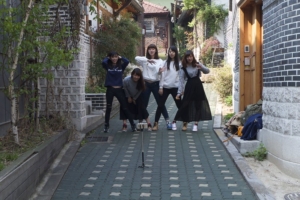 South Korea is one of the most technologically advanced countries in the world, but it has lagged behind in achieving equality for people with disabilities. According to a report by the World Health Organization, there are 1.3 billion people with disabilities worldwide, of which about 2.5 million live in South Korea, accounting for about 5% of the total population of South Korea. This includes people with physical disabilities, speech and hearing impairments, and visual impairments. There are many intertwined factors that contribute to the harsh environment surrounding people with disabilities, and in South Korea, there is a clear link between disability and poverty.
South Korea is one of the most technologically advanced countries in the world, but it has lagged behind in achieving equality for people with disabilities. According to a report by the World Health Organization, there are 1.3 billion people with disabilities worldwide, of which about 2.5 million live in South Korea, accounting for about 5% of the total population of South Korea. This includes people with physical disabilities, speech and hearing impairments, and visual impairments. There are many intertwined factors that contribute to the harsh environment surrounding people with disabilities, and in South Korea, there is a clear link between disability and poverty.
Disability keeps people in poverty
In South Korea, poverty affects more than 30 percent of households with persons with disabilities. People with disabilities face more barriers to success than their non-disabled counterparts, including poor access to education and employment, human rights violations, discrimination, and an overall lack of participation in the community. Higher rates of chronic diseases among people with disabilities also lead to excess medical costs and higher mortality rates.
Stigma increases hardship and reduces resources
One of the most serious factors that push families with disabilities into poverty is discrimination based on prejudice. Disability is viewed negatively in South Korea. Families often limit public interaction, believing that a disabled family member will undermine their social status. As a result, disabled family members are confined to the home and cared for by relatives, but are denied the opportunity to fully participate in society. Common superstitions in South Korea also fuel prejudice. Many believe that disabilities are the result of sins committed in a past life, the misdeeds of ancestors, or being haunted by ghosts.
Following the upsurge in activism following the 1964 Tokyo Paralympics, South Korean policymakers supported the institutionalization of people with disabilities as a cost-effective way to meet the agendas of both activists and the government. The government promised to promote social order through these residential facilities and ease the burden on families to allow non-disabled people to join the workforce. However, serious human rights abuses were rife in these facilities. Celeste Arrington, an associate professor of political science and international relations at George Washington University, wrote that these abuses included “forced sterilization, sexual abuse, assault, and death resulting from such abuse.” Such facilities still exist today, but activists have highlighted the abuses and recent deinstitutionalization efforts have prompted reform.
Protests continue at subway stations across Seoul
Current access protesters also face discrimination. Protesters in Seoul have been gathering during the morning rush hour and protesting near major train station entrances for more than a year. The protests are mainly over increased funding for improved access, such as installing elevators in subway stations.
But commuter attitudes towards the protesters remain hostile. Some say the protesters are causing trouble for commuters and that their actions are wrong. Others point out that many facilities are already available to disabled people. Even Seoul’s mayor, Oh Se-hoon, has stressed how much harm the protests are causing commuters and said he has a “zero tolerance” stance. Progress on the elevator installation plan has been slow.
The fight for rights continues
Hong Yun-hee, one of the protesters, and her wheelchair-bound daughter Jimin are doing their part to make life easier for people with disabilities in South Korea. Yun-hee’s social enterprise, Muui, works to combat prejudice against people with disabilities by encouraging them not to be defined by their disability. The mother-daughter team is also working on creating an interactive map of accessible places in Seoul, and have already completed over 1,000 maps.
Solidarity Against Discrimination against People with Disabilities (SADD) has supported the subway protest movement since its inception. SADD president Park Kyung-seok also personally participated. Despite being referred to the prosecution earlier this year, he promised that SADD will continue to support the protest movement. SADD held a sit-in for five years to abolish the grading system that causes the generalization of the individual needs of people with various disabilities. Eliminating discrimination, fighting for equal rights, protecting the right to move and work, and supporting independent living are SADD’s ideals, and they work to improve disability and poverty in Korea.
Despite a history of mistreatment and prejudice against people with disabilities, South Korea is slowly making progress towards improving the situation for them. Thanks to the work of groups like SADD and innovative people like Yunhui and Jimin, disabled people now have a louder voice.
– Isabella Rothe
Photo: Flickr

